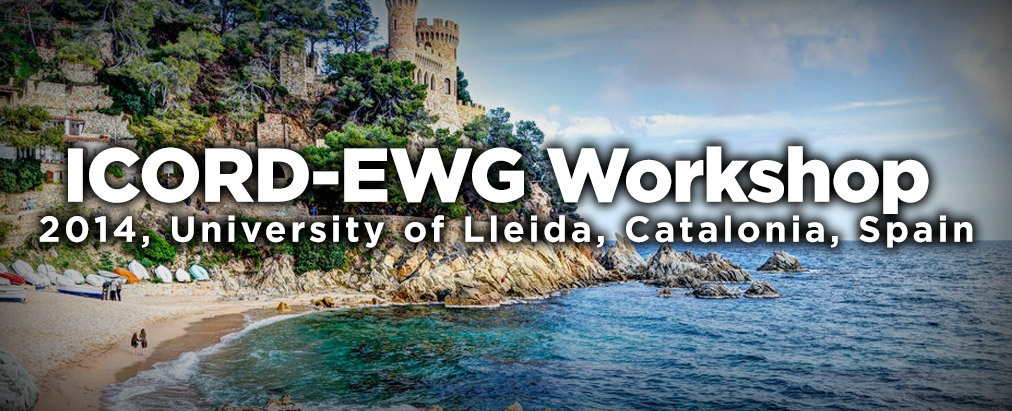
Preceding the Triennial IFORS Conference (Barcelona, July 13 to 18) was the International Conference on Operational Research for Development (ICORD 2014) held at the University of Lleida, Catalonia from July 10 to 11. Just an hour away from Barcelona, Lleida was an ideal venue for a pre-IFORS2014 meeting.
The conference started with a guided tour of Lleida on 9th of July. Lluis Miguel Pla Aragones, apart from being the ICORD Organizing Chair was the perfect tour guide with his in-depth knowledge of the history of Lleida and details of sights along the way. The city tour was done aboard the Hop-on Hop off bus, with a visit to Castell del Rei -Suda (constructed between the late 13th and 14th centuries, a palace where the king resided during his stay in Lleida and holds a castle of Muslim origin dating from 882) and the city’s most emblematic monument, the Seu vella. “High point” of the tour was climbing up the 238 steps of its bell tower by all participants whose ages ranged from 70 to over 20. This time gave everyone a chance to unwind, get to know each other and prepare for the sessions the next day.
The technical sessions started with the registration in the morning of July 10. Participants travelled from all the continents, with 25 participants representing 17 countries. The papers represented developmental issues in India, China, Thailand, the Philippines, New Zealand, Australia, Tanzania, Turkey, Slovakia, Peru, Mexico, Argentina, Chile, Brazil, Spain and the USA. Keynote speech was delivered by Panos Pardalos on Optimization and Economic Modeling of Energy Systems Centering CO2 Issues.
The two-day conference featured a presentation of 18 papers as well as a workshop on Facilitated Decision Analysis for Policy Making in Developing Countries conducted by Gilberto Montibeller of the London School of Economics. Participants were divided into groups to discuss topics assigned to them, followed by a presentation of group output. The session was very lively and generated substantial discussions.
The papers covered a wide variety of development areas which were addressed through a variety of techniques. These areas can be grouped as follows: Health (4), Disaster Planning (1), Legal System (1), Heritage Conservation (1), City Transport Planning (1), Risk Modelling (1), Rural & Local Area Planning (3), Agriculture (1), Power & Energy Sector (3), Water (1) and General (1).
In terms of techniques used, the papers can be broadly classified as: Problem Structuring Methods & Soft OR (4), Information System (4), Modelling Approaches (4), Scheduling & Routing (3), Simulation (2), and Efficient Frontier (1)
In general, Health, Rural & Local Area Planning, and Power & Energy Sector accounted for more than half of the papers. Amongst the techniques/ approaches used, Problem Structuring Methods, Various Modelling approaches and Information Systems accounted for two thirds of the papers. A notable development has been the use Problem Structuring Methods in many situations. On the other hand, a major area of development, Education,was not covered in any paper.
Sue Merchant, in her capacity as IFORS VP and Developing Countries Chair, addressed the audience and on behalf of the Operational Research Society, extended assistance to selected participants of the conference. ICORD has traditionally been organized by IFORS, and in the past Tunisian, Rome and this conference, had also been co-sponsored by the EURO Working Group on OR for Development, chaired by Elise del Rosario.
The organisers allotted adequate time for presentations and additionally planned for two other participants to formally react on the papers apart from open discussions. This format used for the ICORD 2013 workshop in Rome had gotten good feedback as it proved to be beneficial to both authors and reviewers. For ICORD 2014, all participants played a constructive role and were all present for the whole conference duration. Overall, paper quality was very high and the sessions were very effective in communicating the aim and methodology of each paper.
The conference which started with a Lleida tour ended with a banquet at the Punto Estrella Dalmau, where a complete sampling of Catalonian typical dishes, tapas and wines were laid out before the participants. Joyful goodbyes were exchanged, with a promise to reconnect at IFORS 2014. Local organiser Lluis Pla looked after all aspects of ICORD 2014 above and beyond the call of duty, not to mention the untiring efforts of Elise del Rosario, as overall in-charge of the ICORD2014.
